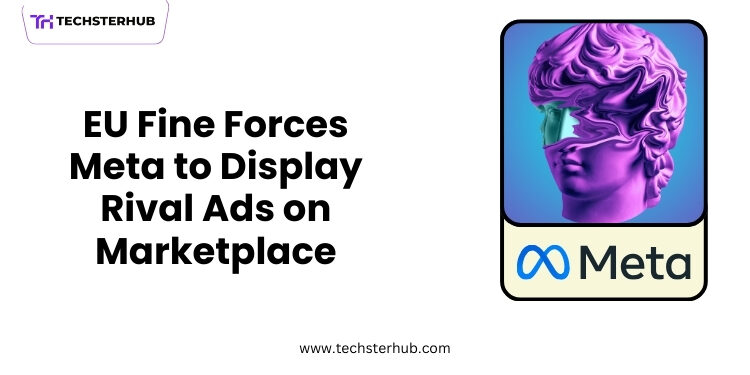The parent company Meta will feature competitor advertisements within its Marketplace section. The company received a fine from the European Union (EU) for anti-competitive behavior which prompted this decision. The European Union ordered Meta to enable competition from rival advertising companies on its platforms. Meta has taken this step to align with EU regulations while preventing additional legal issues.
The EU Antitrust Fine: What Happened?
Meta has encountered multiple challenges concerning its control over the digital advertising sector during recent years. European Union legislation imposes rigorous regulations to prevent dominant companies from abusing their market power against competitive fairness. The European Commission serves as the EU’s special department that examines how businesses compete within markets.
The European Commission began investigating Meta in 2022 after they suspected the company made advertising difficult for competitors on Facebook and Instagram. Meta exploited its widely-used platform to promote its own advertising services then made it more difficult for smaller ad companies to access potential customers. A formal investigation followed which resulted in Meta receiving a fine.
Following the investigation Meta received a penalty in 2024 for breaking EU antitrust laws. The company faced allegations that it created unfair conditions to prevent competing ad services from operating effectively in the online marketplace. Meta agreed to modify its advertising operations because of the imposed fine.
What is the New Change?
Meta has consented to allocate space for rival ad firms within its platforms under the new regulations. Users browsing Marketplace sections on Facebook or Instagram will now encounter advertisements from companies other than Meta. Meta previously used its massive advertising system to control the digital ad market until this major shift occurred.
Meta has consented to allocate space for rival ad firms within its platforms under the new regulations. Users browsing Marketplace sections on Facebook or Instagram will now encounter advertisements from companies other than Meta. Meta previously used its massive advertising system to control the digital ad market until this major shift occurred.
The updated guidelines intend to create equal opportunities for advertising while expanding promotional choices available to marketers on social media platforms. The Marketplace feature on Facebook and Instagram stands as the primary location where these updates will be implemented.
Why is This Change Important?
Meta’s choice to permit competitor advertisements represents a notable development for multiple reasons.
- Promoting Fair Competition: The EU’s antitrust laws exist to make sure businesses compete on a level playing field. The EU has mandated Meta to share its ad space with competitors to prevent any company from monopolizing the market. Smaller companies now have the opportunity to display their ads to users which helps them expand their business reach.
- More Choices for Advertisers: The advertising market now presents advertisers with multiple options for ad placements. Businesses used to need Meta’s ad system because of how popular it was and its extensive reach. The advertising space now hosts more competitors which allows companies to strategically allocate their advertising budgets for improved outcomes.
- Better for Users: Users will experience an increase in relevant advertising from multiple companies due to this change. Users can now encounter advertisements from other brands that align with their interests instead of solely viewing Meta’s ads. The online shopping experience becomes more personalized as well as more diverse.
Meta’s Response to the EU Ruling
Meta has publicly announced its commitment to the new EU regulations and stated that they are now executing the required adjustments. The company has raised concerns about potential impacts on its business model. Meta depends heavily on advertising for its revenue and the newly implemented rules pose a challenge to the company’s market dominance.
The company has indicated that this change might reduce their ability to generate previous advertising revenue levels. The company has committed to follow EU regulations in order to prevent any upcoming legal problems. The company expressed willingness to engage in discussions with the European Commission regarding these changes whenever necessary.
What Does This Mean for Meta’s Future?
Meta has encountered competition law issues multiple times before. Because of previous legal challenges this company has made similar changes before and it is expected to face such situations again in the future. Meta faces legal proceedings elsewhere around the globe concerning both competition rules and privacy issues alongside the EU’s judgment.
Meta may need to alter its business practices further as future fines and legal actions become more likely. The company has publicly stated it will operate its platforms according to EU regulations moving forward. Meta has committed to creating a competitive environment for advertising on both Facebook and Instagram.
The Broader Impact on the Tech Industry
Meta stands among numerous prominent tech companies which have come under examination for their business strategies. Google, Amazon, and Apple have encountered antitrust probes and penalties across multiple nations. The EU stands out for its proactive regulation of the tech industry by enforcing rules that prevent companies from abusing their market dominance.
Meta’s advertising policy revision offers a precedent for other technology companies to follow. Meta’s adjustments could prompt other companies to follow the same path to escape similar fines and legal troubles. This development may trigger new regulations that increase competition while reducing the control of significant industry players over the online advertising market.
Conclusion
Meta consented to display competing ad service providers on its Marketplace following the European Union’s monetary penalty for antitrust offenses. The purpose of this change is to establish equal competitive conditions and expand choices available to advertisers. Meta will encounter difficulties adapting to new regulations but this change can advance diversity and competition in the online advertising industry.
Social media users will encounter a more diverse set of advertisements including those from previously excluded brands. The evolution of digital advertising invites curiosity about how major technology companies will handle new regulations and what this will mean for the future online marketplace.
These changes represent international efforts by governments to control big tech companies so they don’t exploit their power to damage smaller competitors and consumers. The choice by Meta to adhere to EU regulations marks a critical turning point in the continuous struggle over technology rules.











